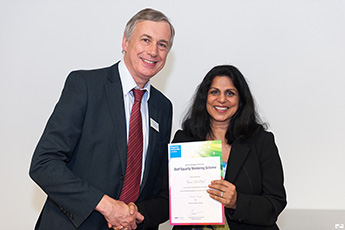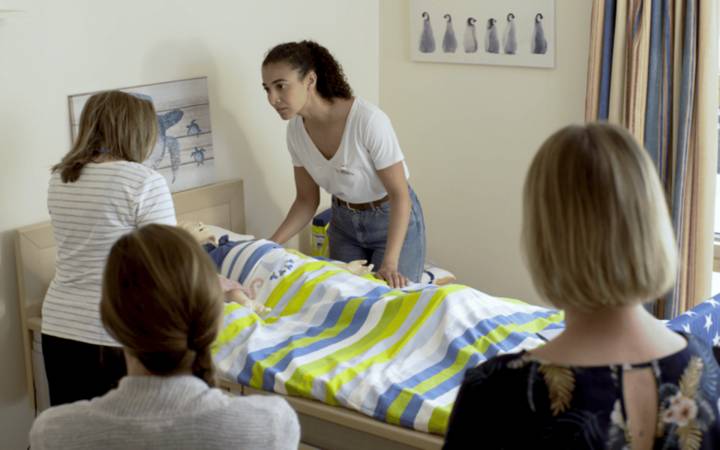Mentoring scheme helps more than a hundred students and staff to succeed
Posted Thursday 4 September 2014
Over the past 12 months, 58 staff and 52 students have participated in the University's equality mentoring schemes, which offer staff and second-year students free one-to-one mentoring, skills development and time for reflection.
 The schemes address equality challenges that have been identified at Kingston through our widening participation targets, the equality objectives and the Equality Annual Report.
The schemes address equality challenges that have been identified at Kingston through our widening participation targets, the equality objectives and the Equality Annual Report.
This year's participants recently gathered to celebrate the completion of the latest schemes at a special event hosted by the Equality, Diversity and Inclusion Unit. Deputy vice-chancellor Dr David Mackintosh presented certificates of completion to both mentees and mentors, thanking them all for their support for this valuable scheme.
The equality mentoring schemes are designed to enable students to develop confidence in their ability to complete their studies, aim for a better degree outcome and gain employability skills. The staff schemes help to improve confidence, provide opportunities to network and develop skills to support progression. And it is not just the mentees who benefit:
David said: "You can get a great deal out of being a mentor. You gain insight into the struggles some people are having; the aspirations they feel they can't fully meet; more understanding of the staff and students that you meet."
Kingston University runs the following schemes:
- Female staff
- Male and female black and ethnic minority staff
- Female students in Science, Engineering, Technology, Mathematics and the Built Environment (STEMB)
- Male and female students with a disability or learning difference
- Male and female students from black and minority ethnic backgrounds
- White male students who are the 1st generation of their family in higher education
Nona McDuff, head of Equality, Diversity and Inclusion, said: "The reason I like this event is because I get to see staff and student mentees, and mentors from both within and outside the University coming together to celebrate and work together. It shows that learning and self-discovery is a lifelong process."
Some of the mentors and mentees share their stories below.
Staff mentee: Winsome Pinnock, head of Department of Creative Writing, FASS
Winsome's mentor was deputy dean of SEC, Dr Lucy Jones. This mentoring scheme greatly influenced her decision to apply for promotion to head of department.
"I found balancing work as a writer and work as a teacher difficult. When statistics were produced showing women and people from BME backgrounds under-achieve, I felt I was experiencing that. It was as if I was not being given opportunities and I was losing my confidence - even if there were opportunities, I wasn't going for them. I signed up for mentoring, thinking it was a networking thing, and I got so much more from it than I had anticipated."
Student mentor: Neomi Bennett
Neomi developed the Neo-Slip anti-embolism stocking while she was a nursing student at Kingston University. She has since been invited to speak with the Prime Minister and travelled the world promoting it.
"Being a mentor to Kingston students was a great way to support the institution that supported me. It has been wonderful to help students; it is an ongoing cycle of people working together to enhance themselves, whether it is to learn something new or to build a new network."
Student mentee: Shiylah Hussain
Forensics student Shiylah was mentored by Anne Wye who is a recruitment account manager at GlaxoSmithKline.
"Before starting mentoring I was shy and lacked the confidence to engage in activities outside my studies. An opportunity arose to work with Anne and it was one of the best decisions I made.
"Mentoring has helped me approach my studies in a different light. I started to use new techniques that expand my capabilities. I developed skills such as time management. Working one-to-one with my mentor I have her full attention. The scheme has helped me identify my strengths and weaknesses and back them up in interview situations. Being able to shadow Anne has given me the insight I have always wanted. It was an amazing experience and I am so thankful."
If you would like to get involved in this year's mentoring schemes, please email beyondbarriers@kingston.ac.uk.
Contact us
General enquiries:
Journalists only:
- Communications team
Tel: +44 (0)20 8417 3034
Email us



